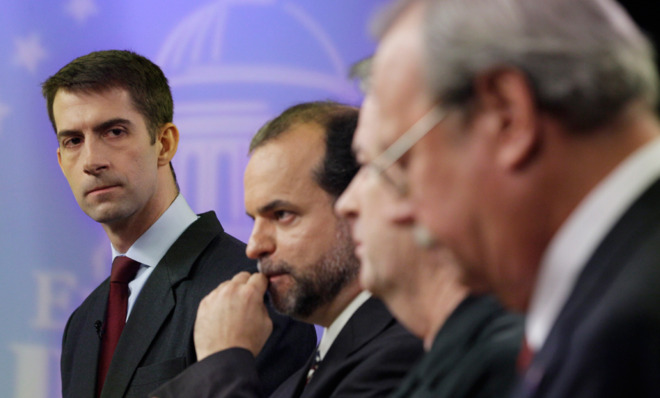Are Republicans blowing their chance to retake the Senate?
Uninspiring GOP candidates and ObamaCare's incredible turnaround may save Democrats come November

The Republican Party is giddily anticipating the coming midterm elections, believing that it has a good shot to reclaim control of the Senate for the first time since 2006. Indeed, the party has a number of reasons to feel optimistic: Democrats have to defend more seats, Republicans have a huge edge in the generic ballot, voters really aren't jazzed about President Obama anymore, and second-term midterms are historically terrible for the president's party.
Given those structural advantages, the consensus has long been that Republicans will do quite well in November; in late March, Nate Silver gave them a 60 percent chance to take back the Senate.
So much for that. Democrats now have a 59 percent chance to hold the Senate, according to the latest prognostication from The New York Times' data model. Worse for the GOP, the trend line shows Dems surging ahead in only the past few weeks.
The Week
Escape your echo chamber. Get the facts behind the news, plus analysis from multiple perspectives.

Sign up for The Week's Free Newsletters
From our morning news briefing to a weekly Good News Newsletter, get the best of The Week delivered directly to your inbox.
From our morning news briefing to a weekly Good News Newsletter, get the best of The Week delivered directly to your inbox.
So what happened? How did Democrats go from doom to optimism so swiftly?
There are two important factors at play here. The first is that Republicans appear to have overestimated the strength of their candidates, thus making winnable races less so. We're not quite talking a Todd "legitimate rape" Akin redux, but a similar phenomena is at work.
And for all the chatter about the political climate favoring Republicans, it may be tilting toward Democrats — especially on the issue of ObamaCare.
Let's begin with the candidates themselves. The Times has a handy rolling interactive on how the odds in individual races have changed over time. It's clear that recent, radical shifts in a couple of key contests — in Michigan and Arkansas — have given Democrats more life.
A free daily email with the biggest news stories of the day – and the best features from TheWeek.com
In Michigan, likely GOP nominee Terri Lynn Land has stumbled straight into the "war on women" trap. She claimed women "have a different lifestyle" and are "more interested in flexibility in a job than pay," prompting withering attacks from Democrats, the local press, and the president. She also appeared to support an abortion ban without exceptions for rape or incest, and has yet to clarify her stance. Though she responded to the mounting criticism with a commercial asking how she, a woman, could wage a war on women, her support has nonetheless eroded in recent polls.
Meanwhile, in Arkansas, GOP challenger Tom Cotton, a military vet and congressman, has turned out to be something of a dud candidate, failing to capitalize in a state where only 33 percent of voters approve of the president's job performance. As Dana Milbank at The Washington Post argues, part of Cotton's problem is that his military service "is no magic bullet," though he's focused on it to the exclusion of all else in his campaign platform. Voters "are already well aware of Cotton's Army career," he writes. "Now they want to know what he has done as a civilian."
After trailing Cotton by wide margins earlier this year, incumbent Sen. Mark Pryor now leads by double digits, according to several recent polls.
With Republicans needing to flip six seats to win the Senate, Democrats should retain control if they hold on to these two seats.
Then there's ObamaCare. Though the law is still relatively unpopular, it is becoming less so. A solid majority of Americans want ObamaCare to stay in place, and the narrative surrounding the law has changed dramatically since the administration announced this month that enrollments crossed the eight million mark.
Republicans may have shot themselves in the foot by making ObamaCare opposition the keystone of their midterm campaign strategy. By insisting for years that the law would be a freedom-killing fiasco — and then shutting down the government in a failed bid to stop it — they left themselves no wiggle room to praise or embrace any of the law's bright spots down the road.
We're already seeing this play out in the way the GOP has tip-toed away from discussing repeal as a viable option. Meanwhile, GOP candidates have been stuck with the near-impossible task of trying to explain their piecemeal — or at times hypocritical — support for ObamaCare now that their dire warnings about its fiery death spiral have been proven wrong.
Consider Land, who called for full ObamaCare repeal while backing its popular Medicaid expansion. Or look at former Sen. Scott Brown (R), who has hemmed and hawed on the issue without giving any semblance of a cogent position as he runs for Senate in New Hampshire. Though he supports Romneycare, he opposes ObamaCare because something something next question.
Then there was news this week that ultra-conservative Gov. Mike Pence of Indiana would accept the Medicaid expansion, badly undercutting the GOP's overall argument.
In perhaps an even sharper sign that ObamaCare is no longer a deadweight for Democrats, vulnerable incumbents like North Carolina Sen. Kay Hagan are wholly embracing it.
As always, Democrats' improved standing today comes with the caveat that anything can change before November. The extreme mutability of polls, as highlighted by the Times' shifting forecast, bears this out.
Yet the recent trends in individual races, as well as the national climate, suggest Democrats aren't doomed to be the minority party in both chambers next year. And if Democrats do hold on, Republicans may have no one to blame but themselves, which is perhaps another indication that the party has fundamental weaknesses that go beyond strategy.
Jon Terbush is an associate editor at TheWeek.com covering politics, sports, and other things he finds interesting. He has previously written for Talking Points Memo, Raw Story, and Business Insider.
-
 The 8 best biopic movies of the 21st century (so far!)
The 8 best biopic movies of the 21st century (so far!)the week recommends Not all true stories are feel good tales, but the best biopics offer insight into broader social and political trends
-
 Washington grapples with ICE’s growing footprint — and future
Washington grapples with ICE’s growing footprint — and futureTALKING POINTS The deadly provocations of federal officers in Minnesota have put ICE back in the national spotlight
-
 ‘One day fentanyl will come back — and there will be little anyone can do’
‘One day fentanyl will come back — and there will be little anyone can do’Instant Opinion Opinion, comment and editorials of the day
-
 The billionaires’ wealth tax: a catastrophe for California?
The billionaires’ wealth tax: a catastrophe for California?Talking Point Peter Thiel and Larry Page preparing to change state residency
-
 Bari Weiss’ ‘60 Minutes’ scandal is about more than one report
Bari Weiss’ ‘60 Minutes’ scandal is about more than one reportIN THE SPOTLIGHT By blocking an approved segment on a controversial prison holding US deportees in El Salvador, the editor-in-chief of CBS News has become the main story
-
 Has Zohran Mamdani shown the Democrats how to win again?
Has Zohran Mamdani shown the Democrats how to win again?Today’s Big Question New York City mayoral election touted as victory for left-wing populists but moderate centrist wins elsewhere present more complex path for Democratic Party
-
 Millions turn out for anti-Trump ‘No Kings’ rallies
Millions turn out for anti-Trump ‘No Kings’ ralliesSpeed Read An estimated 7 million people participated, 2 million more than at the first ‘No Kings’ protest in June
-
 Ghislaine Maxwell: angling for a Trump pardon
Ghislaine Maxwell: angling for a Trump pardonTalking Point Convicted sex trafficker's testimony could shed new light on president's links to Jeffrey Epstein
-
 The last words and final moments of 40 presidents
The last words and final moments of 40 presidentsThe Explainer Some are eloquent quotes worthy of the holders of the highest office in the nation, and others... aren't
-
 The JFK files: the truth at last?
The JFK files: the truth at last?In The Spotlight More than 64,000 previously classified documents relating the 1963 assassination of John F. Kennedy have been released by the Trump administration
-
 'Seriously, not literally': how should the world take Donald Trump?
'Seriously, not literally': how should the world take Donald Trump?Today's big question White House rhetoric and reality look likely to become increasingly blurred
